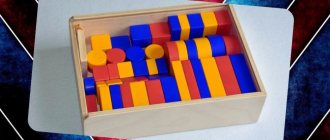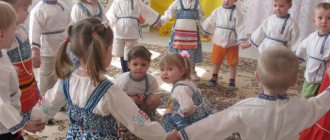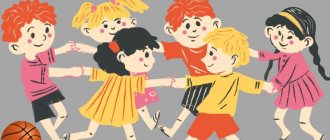My kindergarten
Anton Semenovich Makarenko has repeatedly emphasized that preschool age is extremely responsible in the development of a child’s moral character. Numerous studies confirm that it is during these years, subject to targeted upbringing, that the foundations of a person’s moral qualities are laid.
Author: Karapetyan Inga Nikolaevna, teacher, GBOU School No. 814 DO No. 798, Moscow.
Moral education is a purposeful process towards familiarization with the material values of all humanity and a particular society. The result of the process of moral education is the emergence and approval in the child’s personality of a certain set of moral qualities that influence the child’s personality: the formation of will, character, attitude towards the environment.
A child’s first experience of moral behavior develops in the process of communicating with an adult. And the teacher is a source that satisfies the social need for communication.
One of the tasks of raising children in the younger group is to develop in them the prerequisites for moral behavior and cultural and hygienic skills. Children of the 3rd life who come to kindergarten differ from each other in their level of education, have different skills and are just beginning to get used to the new environment for them. Hence, an individual approach to each child takes on special importance when working with children.
First of all, the teacher needs to gain the child’s trust. A child in the younger group experiences a particularly great need for constant contact with the teacher. How the child’s relationships with adults will develop and develop will largely determine his relationships and culture of behavior in contacts with a wider range of people.
The creation of prerequisites for the cultural behavior of a small child is carried out in several directions. One of them is developing the ability to play and exercise, walk and eat, sleep during quiet time, dress and wash with a group of peers. Cultivating a caring attitude towards toys and things, the ability to overcome small difficulties and bring things to the end, a feeling of gratitude for care and attention, obedience and a sense of sympathy, friendliness towards children and adults - all these are fundamental program areas of the pedagogical work of a teacher in the younger group of a kindergarten.
To make it easier for a child to learn new skills, it is necessary to make this process accessible, interesting and exciting. And this must be done pedagogically subtly, unobtrusively with educational rhymes, games, and jokes. The process is much better and more fun when, helping the child wash, the teacher says, “Water, water, wash my face so that my eyes sparkle, my cheeks blush, my mouth laughs and my teeth bite.”
At the same time, it is important for the teacher to take into account the age characteristic of children of the 3rd year of life - the desire for independence. During early preschool age, a child acquires many skills, mastering which requires some effort from him. Repeatedly repeating such actions as independent dressing, combing one's hair, washing hands, eating, neatly folding clothes in a locker or on a chair before bedtime brings joy to the child; children learn what and how and in what sequence to do. First of all, you should remember: at the initial stage of mastering the skill, you should never rush children. Such an environment will help them maintain a positive emotional attitude. However, the need to meet the time allotted for routine processes remains. Therefore, it is necessary to skillfully direct children’s efforts towards more purposeful actions. We need to motivate them with what is relevant to them at the moment. “Guys, if we quickly put the toys away, we’ll have a longer walk.” Indirect incentives are also effective. “Oh, let’s put on the tights first.” Another, also very effective way is to use competitive games. For example, a team of boys is cleaning up toys on a rug. A team of girls in the board games area. Who is faster?". The nature of the assessment of actions and deeds changes in accordance with the increasing level of consolidation in children of both cultural and hygienic skills and skills of cultural behavior. If at the beginning all the efforts of children are constantly encouraged and assessed positively, with an emphasis on the child’s independence, then in the future only the result of actions is assessed.
The formation of cultural behavior skills also occurs during organized educational activities. Considering the peculiarities of working with children of primary preschool age, this activity should mainly take place in a playful way. This approach ensures good motor and mental activity of children and better assimilation of the material. These can be either low-movement games or didactic ones. Game “Polite Words” - the guys stand in a circle and throw a ball to each other, while calling out a “polite word.” If the child finds it difficult, the teacher prompts: “How do we greet each other?”, “If a friend shared with you, what will you answer?”, “Why are polite words called magic?”
The examples shown by the teacher, his actions, advice, beliefs as a result of constant repetitions in everyday activities develop into stable skills of cultural behavior. And since the leading activity for a child is play, we must not forget to include games in routine moments that clearly demonstrate a culture of behavior. Role-playing game “The doll Masha came to visit”, “At the doctor’s appointment”, etc. In the future, the skills acquired in the game are used in a wide variety of life situations.
At the end of the year, children take part in preparing the group for the summer holidays. They put toys in boxes, place dolls in various vehicles - strollers, cars, and cover surfaces with cellophane. By involving children in collective work, the teacher deliberately creates situations that help him develop skills of moral behavior. In these situations, the guys learn to help and treat each other favorably, agree on the division of labor, and care for the quality of common, joint work.
With the transition to the middle group, in the 4th year of life , children continue to develop independence and the ability to overcome minor difficulties. There are complex requirements for performing actions during routine processes, caring for toys, and for the work of elders. The teacher pays great attention to the formation in children and their implementation of the rules of polite treatment and organized behavior in kindergarten and on the street. When planning work, the teacher pays special attention to the formation of such qualities as sensitivity, attentiveness, courtesy, and tact. They will help the child see and distinguish a person’s state, deciding what to do in a particular case so as not to cause trouble to others.
Evening offers great opportunities for developing a culture of behavior. This is a time for especially confidential communication between the teacher and the children, a heart-to-heart conversation. At this time, the teacher can ask the child what good and bad deeds he has done, how the situation can be corrected tomorrow, etc.
The level of development of children in the 4th year of life makes it possible to somewhat complicate the program requirements for morally oriented games-activities, games-exercises, and dramatizations. Now they are structured so that each subsequent exercise is based on the children’s previously acquired experience. This ensures faster and more durable learning of the skill. For example, you can use an exercise game where the teacher describes the situation in one phrase, and the children characterize it and answer how they should behave: if you start jumping on the bus, talking loudly, then... (children's answer); if you climb onto the seat with your legs, then...; if a girl was walking, tripped over a stone and dropped her doll, then...; if grandma gets on the bus and there are no empty seats, then...
The principle of conducting games is a broader, complex impact on the consciousness and moral feelings of children, as well as providing them with the opportunity to practice performing the necessary actions and deeds. Gradually, children are given more and more independence, bypassing the demonstration of actions, and the opportunity is created for independent exercise in cultural behavior.
Gradually, the teacher introduces new attributes into the play corners, allowing the content of the games to be developed in accordance with the acquired skills of cultural behavior. For example, in the exercise game “Tanya the doll has a cold,” children were shown how to properly use a handkerchief. Then the teacher put clean handkerchiefs in the dolls’ pockets. Children play with pleasure with “sick” dolls and, as a result, after 2-3 weeks, most of them master the skills of properly using a handkerchief, etc.
5-year-old children to speak calmly and with respect; treats adults, their work and leisure, with care, willingly fulfills the requests and instructions of adults, friendly reminds peers about the rules of behavior, behaves with restraint in public places, does not attract undue attention, speaks quietly.
At this age, much attention should be paid to instilling humane feelings in children. Learn to notice the difficulties of others, strive to help them, form ideas about truthfulness, justice, courage, and modesty. Teach children to be responsive to their peers, show attention to their experiences, provide assistance, rejoice in the successes of themselves and their comrades, and empathize in case of failure. Develop friendly relationships. Learn to greet adults and peers, call all kindergarten employees by name and patronymic, politely make requests to others, thank them for the service, do not interrupt the speaker, listen patiently to an adult or peer.
It is important that children follow the rules of behavior in the group in the absence of the teacher. This happens when children do not have double standards - for their aunt and for themselves. When he acts according to the rule, not because he is afraid or so they said, but because it is meaningful to him.
In the older group, at the age of 6 years, the formation of moral qualities of the individual and habits of cultural behavior continues actively. The content of the pedagogical process at this stage is the cultivation of respect for family and friends, affectionate respect for educators, a conscious desire to please elders with good deeds, and the desire to be useful to others. Games such as “Every thing has its place”, “My feelings”, “Polite cat”, “Good and bad”, “Let's give Katya tea” are used.
In older children, it is necessary to actively and consistently form friendly relationships, the habit of playing and studying together, the ability to obey requirements, and in their actions follow the example of good people, positive, heroic characters in famous works of art. In the moral education of older preschoolers, nurturing a culture of communication continues to occupy an important place. The formation of respect for others, goodwill, strong-willed qualities, and restraint occurs in a group of peers. The team plays an increasingly important role in children’s lives, and children’s relationships become more complicated.
In the behavior of an older preschooler, the connection between moral qualities and personality traits with intelligence, with cognitive and attitude to the world around us, to activities, to adults and peers, and to oneself becomes clearer. In the process of communication, a child may already be restrained, able to act in the interests of a partner or peer group, while showing sufficient volitional efforts. But, of course, this is only the beginning of a skill that needs to be developed and consolidated.
The main method of moral education at an older age is ethical conversation. This method of moral education is distinguished by its significant originality. The content of ethical conversations consists mainly of genuine life situations, the behavior of people around them and, above all, the students themselves. The teacher characterizes the facts and actions that the child observed or performed in communication with peers and adults. Such characteristics form in children objectivity in assessing events, help the child navigate a given situation and act in accordance with the rules of moral behavior.
The main goal of ethical conversations is to form in the child moral motives of behavior that could guide him in his actions. And such conversations should be based, first of all, on genuine events and phenomena, which are abundantly provided by the life and activities of a child among his peers. When preparing for such a conversation, the teacher must analyze what was the subject of the children’s most vivid impressions, how they perceived what they saw, how they experience it.
If a teacher considers it necessary to include excerpts from a particular work of art into an ethical conversation, he must necessarily subordinate their content to the functions of the educators. If the content of the conversation is accessible and interesting to children, then interested questions, vivid emotions, and sincere assessments follow: the teacher, as it were, reveals the child’s inner world. This allows you to reasonably determine how the kids perceived the idea, the moral of the work, and makes it possible to further tactfully correct the children’s behavior. And the fact that the whole group of children jointly discuss the facts of behavior and various situations evokes empathy, the emotional influence of children on each other, and contributes to the mutual enrichment of their feelings and ethical ideas.
The behavior of pupils in older groups convincingly indicates that at this age there is a gradual transition from the perception of the content of individual actions to enriched concepts of good behavior. Through ethical conversations, the teacher connects disparate ideas in the minds of children into a single whole - the basis of a future system of moral assessments. It is the assimilation of ethical concepts in a certain system that helps an older preschooler understand the essence of the concepts of goodness, common good, and justice that forms the initial concept of human dignity.
In the preparatory group at the age of 7 , the main task of the moral education of preschoolers is, first of all, to consolidate, deepen and expand everything that children have acquired over the entire previous period of their stay in kindergarten.
In everyday pedagogical practice, the educator must strive to make the child’s moral feelings become deeper, and their manifestation in relationships with people, their activities, and their home country become more stable and organized.
Children's moral ideas about the phenomena of social life, about the inherent qualities of people (such as justice and honesty, hard work and responsibility, etc.) become more conscious. They acquire greater generalization, and the skills of moral behavior become more durable and natural, they acquire greater breadth and stability, so that the child behaves in accordance with the norms of behavior not only in kindergarten and at home, but also in any environment.
Particular attention of the educator in this age group should be focused on instilling in children the need to observe the rules of personal hygiene, natural mutual assistance, the formation of strong-willed qualities, and the accumulation of experience in humane relations and a culture of behavior. To ensure organic continuity between kindergarten and school in moral education, a high level of education in the broad sense of the word is very important. It is the positive experience of humane relations between children that the primary school rightly considers as the main result of the moral education of the child in the previous period; It is on this foundation that further development of new forms of moral behavior occurs in the primary grades.
The learning process also depends on the education achieved. Among the negative qualities of a first-grader that complicate educational activities and education, teachers often name sloppiness and lack of composure. Cleanliness and upbringing during the preschool years provides the first-grader with natural, effortless maintenance of the order of his portfolio in the workplace and thereby saves time for educational activities. Letting children go to school with such qualities as perseverance and perseverance in achieving results is one of the most important educational tasks in the school-preparatory kindergarten group. It is important to note that when working with children of this group, it is necessary to ensure that the child’s acquired experience does not conflict with the new knowledge that he will receive in the process of upbringing.
It is also necessary to carefully consider how children’s behavior is reflected in their impressions obtained as a result of observations of various life situations, what is the attitude of children to the observed actions of comrades and adults. It should be remembered that in the preparatory group the game techniques included in the educational process do not lose their importance; combining them with ethical conversations, the teacher unobtrusively reveals to the children visual examples of everyday communication. It is also important that morally oriented classes and conversations contain not only the rules of etiquette, but also interesting practical exercises in cultural communication. For example, in the dramatization game “The Good Doctor,” you can ask the child to think about what a good doctor should do in the following situations:
- A mother came to the doctor for an appointment with a boy who was very afraid of an injection and was crying.
- Several patients are arguing in front of the doctor's office;
- The nurse is often late for work;
- The nurse does not wash medical instruments well.
Then the child chooses one situation and comes up with a small dialogue scene, which the teacher helps, if necessary, to act out.
Children really like conversations that contain the topic “Learning to care.” The teacher helps the children think about what they would do and show their care if: if their mother got sick; the younger brother is capricious; grandma's birthday; dad returned from work tired; your friend did something bad, your sister was scolded by your parents. By using these games you can more effectively influence the child’s inner world.
Carrying out an analysis of pedagogical, methodological, psychological literature on this topic, it becomes clear that the moral education of children can be seen as a “red thread” in all types of children’s activities, that their mastery of moral norms and values, the development of moral qualities occurs in the game.
Bibliography:
- Boguslavskaya Z.M., Smirnova E.O. Educational games for children of primary preschool age - M.: Education, 1991 - p.207
- Bolotina, L. R. Preschool pedagogy: a textbook for students of secondary pedagogical educational institutions / L. R. Bolotina, T. S. Komarova, S. P. Baranov. – 2nd ed. – M.: Academy, 1997.
- Bure R.S., Ostrovskaya L.F. Teacher and children. – M.: Education 1985 – p. 143
- Developmental and educational psychology. // M.V. Matyukhina, T. S. Mikhalchuk, Prokina N.F. and etc.; Under. ed. Gamezo M.V. and others - M., 1984.
- Bure R.S., Godina G.N., Vinogradova A.M. Education of moral feelings in older preschoolers. -M.: Enlightenment. – 1989.
- Ermolaeva M.V., Zakharova A.E., Kalinina L.I., Naumova S.I. Psychological practice in the education system. – M., 1998
- Kovalchuk L.I. Individual approach to raising a child: 2nd ed., additional. – M., – 1985.
- Kozlova S.A., Kulikova T.A. Preschool pedagogy. – M., 1998.
- Makarov S.P. Technology of individual training. // Pedagogical Bulletin. – No. 1. – P.94.
- Vetlugina N. A., Kazakova T. G. Moral and aesthetic education of a child in kindergarten. – M., 1989.




